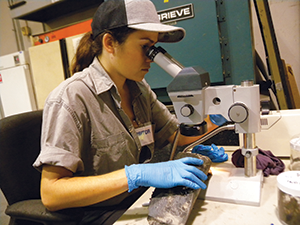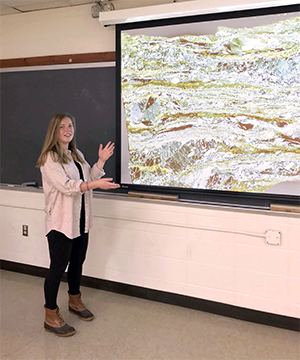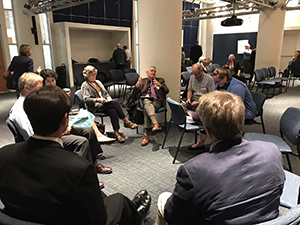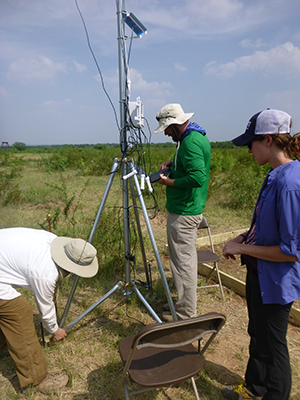Skills and competencies needed by graduate students for successful careers should be integrated into Earth, Ocean, and Atmospheric Sciences graduate programs

Most geoscience employment requires a graduate education, primarily a master’s degree, and for research-related careers, a doctoral degree. This continuing education builds on the undergraduate educational foundation, while adding a strong research component.
A separate NSF sponsored initiative on the “Universal Skills for Geoscience Graduate Student Success in the Workforce” investigated skills and competencies that should be part of graduate geoscience education for doctorate and master’s students in Earth, ocean and atmospheric sciences. Recognizing that only about half of all STEM and geoscience doctoral students end up in academia (and under 5% of geoscience master’s students; Wilson, 2018), the project’s goal is to work with heads, chairs and graduate program directors on best practices and strategies for integrating employer recommended skills and competencies development into graduate programs nationally.
Process Summary
In the fall of 2018, a Geoscience Employers Workshop was held with 52 participants representing a broad spectrum of employers of geoscience graduate degree recipients in Earth, ocean and atmospheric sciences. The employers included industry, non-profits, and other organizations in the areas of weather and climate, energy and natural resources, oceans and fisheries, environment, and reinsurance and hazards. It also included government agencies including NOAA and multiple branches of NASA, as well as research labs and universities. Following the same format as the undergraduate effort, employers discussed and provided feedback to academia on the skills and competencies needed by doctoral and master’s graduates for the current and future workforce. Despite the wide breadth of occupations, there was overall agreement on what graduates need and what current graduates generally lack upon entry to the workforce.
In May 2019, a Summit was held for department heads, chairs, and graduate program directors to discuss the employers' input, and strategies for supporting the development of these key skills and competencies in their graduate programs. The Summit comprised 74 participants, 60 from doctoral and 5 from master’s only granting universities and colleges, plus four industry and four professional society representatives. All three branches of the geosciences (Earth, ocean, and atmospheric sciences) were represented. The heads and chairs were in general agreement with employers in terms of what graduating geoscience graduate students have and lack in terms of the identified skills and competencies. Most of the discussions focused on the best ways to address these deficiencies, and 60 individual action plans were developed and submitted. As with the undergraduate Summit effort, progress reports have be requested after 12 to 18 months.
Skills and Competencies
Geoscience employers built on results of the 2015 Undergraduate Geoscience Employers Workshop and on studies of graduate STEM education by the National Academies in 20181 and the Council of Graduate Schools in 20172. The employers focused on the additional skills and competencies and different level of skills development that Earth, ocean and atmospheric science graduate students need for the current and future workforce. Although a large portion of the employers focused on research-oriented careers, those for whom primary research was not a focus in their sector voiced similar views.
Depth of Expertise in Core Areas
Depth of expertise in their core disciplinary areas is critical in doctoral and master’s graduates, leading to good judgement and professional confidence. Employers stressed the need for good foundational skills, strong grounding in the geosciences, and course background in their chosen field, even if students switched fields after their undergraduate degrees. Developed core technical skills in their relevant areas of expertise was deemed absolutely necessary. Graduates need a deep understanding of the fundamentals and mechanics of the techniques and methods they are using. The employers also thought that in addition to breadth in their core area, graduates should have grounding across all sciences. Overall, the employers agreed that current geoscience graduates are excellent scientists with very strong technical and research skills, including laboratory and field skills, and with a solid base of knowledge of their field of geosciences.
Problem Solving and Critical Thinking
The most important skills identified regardless of discipline are problem solving and critical thinking. Graduates should be able to think logically, be flexible and open-minded, and be pragmatic in their critical thinking. The expectation for finishing graduate students, particularly doctoral recipients, was that they be independent critical thinkers who can identify and define a problem and develop and implement appropriate solutions with solid analytical and technical skills. In the workplace environment, there is usually neither the time nor need to find the complete solution, but it is critical to know whether the chosen solution is sufficient. Being able to define a sufficient solution to a problem, versus a precise and complete solution, was seen as very important.
Another aspect that employers said graduates found difficult was understanding the broader impact of their research and what decisions would be made using their findings. For any given problem, they need to understand and articulate the importance of their outcomes. Employers noted that many graduates struggle with defining a problem but could solve a problem given to them. In either case, they had difficulty identifying how to apply the solution.
Teamwork and Collaboration
Teamwork and collaboration permeate the work environment, where diversity of thought is important and valuable. The ability to work effectively with other scientists and professionals towards a project goal is critical. Beyond technical ability, being able to foster cooperation and manage conflict was crucial in teamwork. Doing so requires developing self-awareness and knowing one’s own strengths and skills as well as recognizing the capabilities of the people around you. Being personally versatile matters — graduates need to be able to lead, to follow, to accept coaching and to take directions. Employers agreed that teamwork and collaboration was an area where new graduates generally lacked experience and would benefit greatly from improvement.
Leadership
Leadership involves being able to effectively guide others to accomplish goals and/or objectives in a coherent and cohesive manner. Leadership abilities are as essential in science and education as they are in business, public policy and politics. Regardless of the graduates' career directions, their ability to lead teams, groups and/or organizations is an important skill, which employers generally found lacking in their new geoscience employees. Leadership requires recognizing purpose, making commitments, identifying and implementing a strategy and having the determination to accomplish one’s stated goals. Leaders need to have passion and be good communicators. They also need to accept responsibility for both positive and negative outcomes, be good at listening to what others think, and appreciate the viewpoints and the accomplishments of others. Good leaders are honest and have integrity, humility, and a good set of values and principles.
Communication

Communication is a common limiting factor to success, regardless of the profession. The ability to express technical work effectively in writing and verbally to diverse audiences is critical. Audiences may include those within one’s specialty, other science and engineering fields, as well as non-technical audiences such as management, the public, public policy makers, politicians and the press. Being sensitive to one’s audience (i.e., reading the room), is important in finding the appropriate level to communicate effectively, and in recognizing when your audience is engaged and understands what you have to say. Complex material needs to be conveyed in a simple way, without relying on technical jargon or acronyms, and ideas expressed logically. Being able to communicate effectively about societal and/or financial impacts is important. In today’s global world, effectively communicating with people whose first language is not English is also critical.
In writing, graduates need to be able to evaluate and recognize credible sources, and to have sufficient editing skills to both critically evaluate written work, and to accept and use criticism of their own writing. Employers also stressed listening skills as a critical competency: to be able to pay attention to what others say, and answer questions sensibly and logically.
Computational and Quantitative Skills
Computational and quantitative skills are essential for all types of geoscience employment. Employers thought that students entering graduate school should have the basics of statistics and higher-level math as undergraduates, including calculus, differential equations, linear algebra and statistics for communicating certainty. If not, they would need to acquire them in graduate school.
Employers noted the need for more computational skills, but within the ability to make observations. These skills include basic programming in scripted languages and being able to code and translate older code to newer and more effective systems.
Being able to develop, analyze and evaluate computational models is also a needed skill. In discussing current and future workforce needs, the ability to analyze algorithms will be important with the increase in machine learning. Keeping up with the transition to cloud computing and its unique approaches to massive scalability and parallelization will make cloud-based data manipulation and management important. For doctoral and some master’s students, the employers were looking for those that embraced technology not only as users but also as creators with a willingness to engage in genuine innovation.
Data Management and Data Analytics
Of all the research skills, the one emerging skill of critical importance across the entire employer spectrum was data management and data analytics. Finishing graduate students need an awareness of data analytics, its applications, and of the processes for using data. They need to be able to work with complex and multiple large datasets, examining them to draw conclusions about the information they contain, including mining data to answer questions that are yet to be framed.
Data acquisition and collection requires working with different types of data and different data sources, establishing data credibility, and using available tools to access and interpret the data. Understanding and evaluating data quality and being able to appropriately use data of different qualities is essential. Data analysis and management necessitates using data effectively and being proficient at examining and synthesizing data from different perspectives (e.g., air, ground, etc.), using various types of data, and knowing the tools for the analysis and organization of data. Data analytics is an expanding field, and learning and developing new ways to manage, analyze and synthesize data will be needed.
Data integration and the merging of different types of data and information is required to solve complex geoscience problems. With a growing influx of new observations, data assimilation and sequential updating of model forecasts is necessary. Also crucial are the ability to model and know the limits of modeling, and to create visualizations and/or simulations to display and explore data. Employers also discussed the advent of machine learning, artificial intelligence (AI), robotics, immersive virtual reality data exploration, and other data science that is currently becoming significantly more important and will continue to be in the future. They also mentioned understanding how to monetize data or data valuation as a useful skill. Looking ten years to the future, employers saw all fields becoming more data centric, with the use of different programming languages, changing algorithms, and increased emphasis on tools for visualization and simulations.
Systems Thinking
Systems thinking is critical. Employers stressed the need to consider entire systems and recognize that any parts in isolation may act differently than when within the system. Thus, it is important to start at the system level and evaluate the interactions and limitations of its different parts. In solving problems, employers were looking for those who could look at the big picture first, then drill down to details, and bring that information back up to the system level. Employers agreed that systems thinking was required for all types of systems and that the Earth needs to be treated as a complex, non-linear, interactive, coupled system with interaction, linkages and feedback between different processes and parts of the system.
Project and Program Management, Business Skills
Managing projects and programs is a critical skill for success regardless of career, but one geoscience employers reported lacking among new employees. These skills include understanding budgets and project financials, managing people, time, resources and overseeing multidisciplinary projects. The specific competencies run the gamut from knowing how to run a meeting, including developing an agenda, time management, etc., to knowing the factors that drive the decision-making process.
Although proficiency was not expected, employers thought improvement in business skills was needed. Exposure to the basics of business and business operations is important, including economic, data-driven decision-making, risk analysis, uncertainty quantification, and time-value concepts, i.e., that time is money and money today is worth more than the same amount of money in the future. Innovation and entrepreneurship also play major roles in business success.
Scientific Process, Ethics and Professionalism
Employers were satisfied that their new doctoral and master’s geoscience employees understood and were experienced with the scientific process of observing, characterizing, understanding, modeling, predicting, and verifying. In addition, geoscience graduates should have a good grasp of uncertainty and the scalability of space and time. Employers also discussed the need for awareness of risk and impact, the importance of simulation, and application-driven questions. Geoscience graduates should understand that research should have a clear societal purpose and be able to demonstrate that societal connection. They should have a clear understanding of research integrity as essential to science and the research process, including understanding plagiarism, self-plagiarism, proper attribution to true sources, and the ground rules for scientific citation and research. Core values are also critical, such as being trustworthy, honest, and ethical, etc.
Professional Growth
Being a life-long learner and knowing how to learn is critical, as is a diverse and adaptable skillset. New graduates should know how to search for information electronically and otherwise. Employers are looking for those with an internal drive to do well, including overcoming fear of failure and the inherent risk aversion in adopting new technology to address major problems.
Social Dynamics
Employers indicated that a general lack of social skills among most new graduates is a barrier to future success. People skills related to interpersonal and cultural behavior are very important. Personal opinions about an individual are irrelevant to professional conduct and cooperation. It is critical to be able to work with people who come from different cultures, experiences, and backgrounds.

Corporate skills were also deemed very important; academia, industry, government and business all involve different work cultures. In many environments, employees need to learn to take direction and do directed work, as well as know when innovation is encouraged and appropriate. A required corporate skill is being able to distill everything you have done and make it accessible and relevant to a CEO, manager, program director, client, or the public.
Professional Development
Students need a roadmap for professional development that starts with learning about career options and how to gain the necessary skills and knowledge to obtain their career goals. Customized roadmaps can be developed by students as they progress through their graduate career using Individual Development Plans (IDPs) (See for example, AAAS Science Careers: my IDP3; Section 7).
Students also need training on how to secure employment, including where to search for job openings, how to apply, and the factors that can get them hired. They need to understand the information included in a resume, a cover letter or an application depends on the type of employment being sought. Students can learn interviewing skills, how to prepare for online, phone or in person interviews, typical questions that may be asked, how they can self-market, and how they can present their unique expertise. Students also need to know how to network, including what to do and not do, and where to be or not be seen. Students should always be ready to give an “elevator speech” — a brief statement of what they have accomplished in their research and why it is significant. Today a critical piece of one’s professional existence is their virtual presence or brand. How one appears on social media can affect their ability to get and keep a job. Finishing students commonly only think about their first job, but many employers said that when they interview, they are looking for people with the ability to move up and transition within an organization. Thus, it is worth investigating what the options are for advancement prior to an interview and asking about it during the interview.
Level of Competency
Both doctoral and master’s students are expected to attain mastery of nearly all of the skills and competencies discussed above. Doctorate recipients are expected to be experts in terms of depth in core areas and critical thinking and problem solving. In a few areas, such as systems thinking and project management, master’s recipients are only expected to be proficient. The level of accomplishment needed for specific skills varied to some extent with employment type. Employers across the geoscience spectrum expect competency in written and oral communication, a capacity for learning, adaptable skillsets, systems approaches, programming, simulation, data skills, problems solving and critical thinking. Employers saw their role as providing specialized job training as needed, either in house or through professional programs.
Graduate Education and Future Careers

Most graduate education, particularly at the doctoral level, is too narrowly focused on academic research and preparing students for future academic careers. A strong doctoral researcher is distinguished by a deep technical dive into one subject, the ability to discover, own and solve a problem independently, a high level of creativity and innovation, and the ability to create new knowledge. These competencies are essential, but students also need to develop professional and personal skills valued by both academic and non-academic employers, including teamwork, project management, leadership, and communication. Incorporating these non-core research skills into the graduate program culture was viewed as very important, but not at the expense of losing its rich research focus. Both research and applications have transitioned to multi-, inter- and trans-disciplinary in nature. More geoscience research and occupations are critical to society, and demographics are changing to be more diverse and global. These changes require a spectrum of skills and competencies now, and the ability to continue to learn and master transferable skills.
At the 2019 Summit, heads, chairs and graduate program directors discussed ways to integrate these competencies and skills into graduate courses, research, and co-curricular programs. They recognized that faculty needed to work with their graduate students to help them identify their career aspirations, and what skills they have or need to acquire to achieve their goals. Moving toward the widespread use and support of graduate student IDP’s was strongly recommended. With mentoring and acceptance of their graduate students' career goals, the needed competencies and skills can be developed without sacrificing the depth of preparation geoscience graduate students gain in research.
Recommendations:
-
Graduate programs should integrate development of employer recommended skills and competencies into graduate programs while maintaining a research focus
-
Faculty should support the career goals of their graduate students, recognizing that the recommended skills and competencies are essential to students' future success in both academic and non-academic careers
-
Undergraduate programs should build the educational foundation needed for students who will pursue graduate degrees